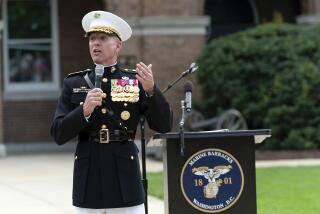Ralston Withdrawal Seen as Likely
WASHINGTON — Air Force Gen. Joseph W. Ralston on Sunday returned here from Central Asia amid growing suggestions that he will withdraw his name from consideration as chairman of the Joint Chiefs of Staff when he meets today with Defense Secretary William S. Cohen.
The move seemed virtually inevitable after key members of Congress said Sunday that Ralston would face serious hurdles winning Senate confirmation because of the controversy surrounding his admission of an adulterous affair 13 years ago.
“I believe that there’s been such a cloud created in this climate as we’re looking into the issues of sexual misconduct that it would be very difficult for him to be confirmed before the U.S. Senate,” said Rep. Stephen E. Buyer (R-Ind.), who chairs a House subcommittee on military personnel.
The American people, Buyer said, have an “acceptable” right to expect a higher standard of conduct from the military. “We don’t want to lower the ceiling. . . . And that’s why I anticipate Gen. Ralston will withdraw,” he said on NBC-TV’s “Meet the Press.” “He needs to set the example.”
Ralston, who currently serves as vice chairman of the Joint Chiefs of Staff, would face a “rocky road” and tough questioning in the Senate, said Sen. Olympia J. Snowe (R-Maine), the only woman on the Senate Armed Services Committee.
The contentious issue involves more than the consequences of adultery by military personnel, Snowe said on ABC-TV’s “This Week.” It also raises questions about whether a double standard applies in such situations, depending on whether a man or a woman is at fault. That discrepancy “ultimately can erode morale in the military” as well as public confidence in the services, she said.
The controversy over Ralston has been exacerbated by the recent scandal involving former Air Force 1st Lt. Kelly Flinn, the nation’s first female B-52 bomber pilot. Flinn faced a court-martial for committing adultery and having sex with an enlisted man, in addition to lying and disobeying orders, until a national outcry led the Pentagon to let her resign, although without the honorable discharge she requested.
Rep. Jane Harman (D-Rolling Hills), a member of the House National Security Committee, predicted on “Meet the Press” that Ralston would withdraw his name “for the good of the country” and to save the Clinton administration embarrassment.
No one has been formally recommended to succeed Gen. John M. Shalikashvili as chairman of the Joint Chiefs, but Ralston’s name has been circulating as the Pentagon’s favorite.
When women’s groups and legislators began to question the choice, Cohen initially argued that the extramarital affair, which went on for more than a year, should not disqualify Ralston.
On Sunday, Pentagon officials went to pains to say that Ralston was never Cohen’s personal choice for the chairmanship, but remained “a leading candidate.”
The adulterous affair, which occurred at a time when Ralston was separated from his then-wife, should not automatically disqualify the Air Force general from the nation’s top military assignment, Harman said. But, she added, it does not mean the Defense secretary should recommend him, or that the White House should nominate him.
As the bandwagon against Ralston’s nomination appeared to gain momentum, one of the few voices urging the Pentagon not to succumb to public opinion was former Secretary of Defense Caspar W. Weinberger. If Ralston is indeed Cohen’s first choice, Weinberger said on “This Week,” the administration should stand behind him.
“I would stand by him, as I think Secretary Cohen has tried to do,” said Weinberger, who served in the Reagan administration.
The Ralston controversy has added fuel to an already volatile debate on the role private relationships should play in evaluating public performance of military personnel.
Harman said a person’s sexual activities should not be a public issue unless they “interfere with good order and discipline” in the military. Weinberger concurred. “We employ these people to fight and win wars for us. We don’t employ them to lead celibate lives,” he said.
Meanwhile, Time magazine reports in its latest issue that former Joint Chiefs of Staff Chairman Colin L. Powell “privately grumbled” to friends that Ralston is not the type of military leader who should run the Pentagon.
Ralston made no public comments upon his return to Washington on Sunday. Pentagon officials said the fighter pilot and highly decorated Vietnam War veteran wants to get a firsthand feel of the controversy and public reaction before reporting to Cohen. Shalikashvili is also expected to participate in those talks.
The meeting is expected to be followed by a statement from Ralston, Pentagon officials said.
Ralston may find that his options are limited. Names of other potential candidates to succeed Shalikashvili, who has proved to be a popular figure in military and political circles, began to surface over the weekend before Ralston arrived home. Among them is Army Gen. Wesley Clark, who like President Clinton comes from Arkansas and was a Rhodes scholar. Clark now serves as commander of U.S. forces in Central and South America. Other names making the rounds include Marine Corps Commandant Gen. Charles Krulak and Marine Corps Gen. John Sheehan.
More to Read
Get the L.A. Times Politics newsletter
Deeply reported insights into legislation, politics and policy from Sacramento, Washington and beyond. In your inbox three times per week.
You may occasionally receive promotional content from the Los Angeles Times.









